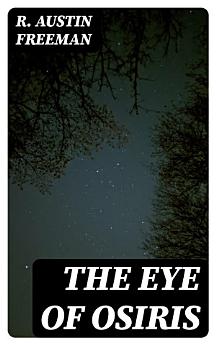The Eye of Osiris
R. Austin Freeman
Sep 2022 · DigiCat
Ebook
236
Pages
family_home
Eligible
info
reportRatings and reviews aren’t verified Learn More
About this ebook
In 'The Eye of Osiris,' R. Austin Freeman crafts a meticulous narrative that transcends the confines of the detective genre, intertwining elements of mystery, science, and ethical inquiry. Set against the backdrop of early 20th-century London, the novel follows the astute Dr. John Thorndyke as he navigates a web of intrigue surrounding a series of seemingly unrelated events connected by a rare Egyptian artifact. Freeman's distinctive use of forensic science and legal principles lays the groundwork for a compelling exploration of the intersection between rationality and belief, encapsulated in a literary style that marries clarity with acute observation. R. Austin Freeman, a pioneer in the crime fiction genre, was deeply influenced by his background in medicine and law, both of which inform his intricate plots and well-developed characters. Freeman's fascination with the scientific method permeates his work, reflecting a broader cultural movement during the Victorian era that celebrated empirical evidence. His insights into human behavior and societal norms are masterfully articulated through the character of Thorndyke, a reflection of Freeman's own rationalist inclinations. For readers interested in a sophisticated blend of mystery and intellectual challenge, 'The Eye of Osiris' is highly recommended. Freeman's ability to engage with moral dilemmas and scientific logic offers a refreshing perspective on crime fiction, making it a compelling read for those who favor depth alongside suspense.
About the author
Richard Austin Freeman, born on April 11, 1862, in London, England, was an eminent British writer of detective stories, mostly featuring the medico-legal forensic investigator Dr. John Thorndyke. He studied medicine at Middlesex Hospital Medical College and subsequently enlisted as a colonial surgeon, an experience that provided substantial background for his future literary undertakings. Freeman's professional medical knowledge deeply influenced his writing style and narrative structure, helping him create intricate and scientifically based plots that were innovative for the detective genre. 'The Eye of Osiris' (1911), one of his notable works, exemplifies Freeman's mastery in weaving archaeology, Egyptology, and forensic science into a riveting tale of intrigue and suspense. Freeman is credited with inventing the 'inverted detective story' format, where the commission of the crime is described at the outset, followed by the detection process. His literary contributions were well acknowledged, as he was acclaimed for his attention to detail, meticulous plotting, and the intellectual stimulation provided by his creation Dr. Thorndyke, who often used cutting-edge scientific methods to solve crimes. Freeman's works have left a lasting legacy in the genre of detective fiction and continue to be celebrated by enthusiasts of early 20th-century mystery literature.
Rate this ebook
Tell us what you think.
Reading information
Smartphones and tablets
Install the Google Play Books app for Android and iPad/iPhone. It syncs automatically with your account and allows you to read online or offline wherever you are.
Laptops and computers
You can listen to audiobooks purchased on Google Play using your computer's web browser.
eReaders and other devices
To read on e-ink devices like Kobo eReaders, you'll need to download a file and transfer it to your device. Follow the detailed Help Center instructions to transfer the files to supported eReaders.








